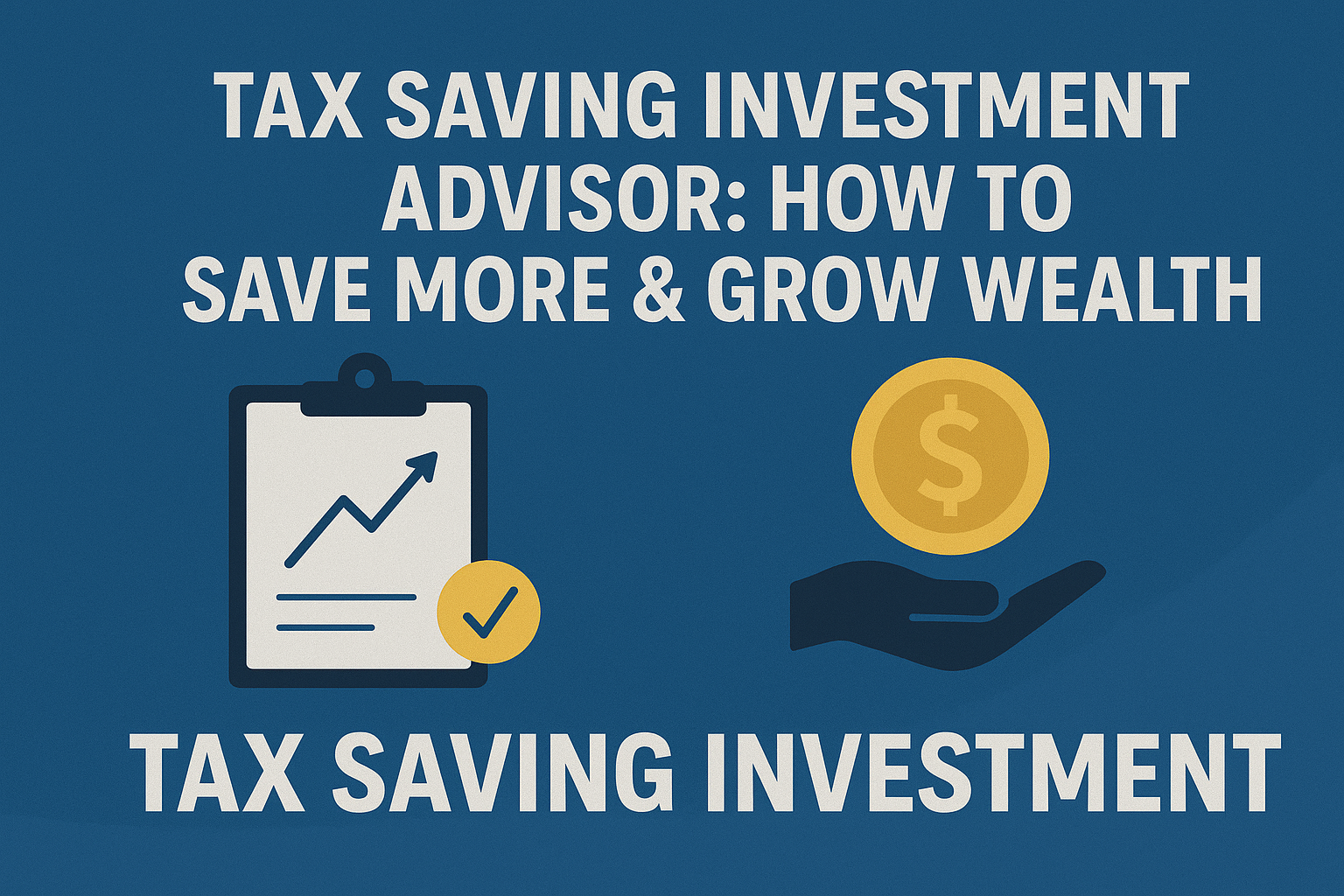In India, tax planning is often treated as a last-minute scramble before the financial year ends. Many investors rush to put money into popular schemes without fully understanding whether those investments align with their long-term financial goals. This approach may save some tax in the short term, but it often results in suboptimal returns or liquidity problems later.
A tax saving investment advisor can change this narrative. They not only help you minimize your tax liability legally but also ensure your investments work towards building sustainable wealth. In this detailed guide, we will discuss why tax planning should be part of your investment strategy, the best tax-saving options in India, the benefits of working with a professional advisor, and real-world examples of how expert guidance can lead to substantial savings.
Why Tax Planning Should Be Part of Your Investment Strategy
Many people see tax planning as a compliance requirement rather than a proactive wealth-building tool. But the truth is, efficient tax planning can help you keep more of what you earn while making your money grow.
1. Maximizing Disposable Income
By reducing your tax burden, you increase your disposable income. This means more money can be directed towards investments, lifestyle improvements, or other financial goals.
2. Compounding Benefits
When you save tax and reinvest that amount into high-yield assets, you benefit from compounding over time. A few thousand rupees saved each year can translate into lakhs over decades.
3. Avoiding Last-Minute Decisions
Planning taxes well in advance ensures that your investments are chosen based on suitability and potential returns, rather than urgency.
4. Aligning Tax Savings with Goals
A good tax plan integrates with your overall investment strategy. For example, if you are saving for your child’s education, you can choose tax-saving schemes that also help you achieve that goal.
5. Peace of Mind
Knowing you’re compliant with all tax laws and making optimal investment decisions reduces financial stress.
Top Tax-Saving Investment Options in India
The Indian Income Tax Act provides various sections under which taxpayers can claim deductions and exemptions. A tax saving investment advisor can guide you in choosing the best combination of these options based on your income, goals, and risk profile.
1. Equity-Linked Savings Scheme (ELSS)
- Tax Benefit: Deduction under Section 80C up to ₹1.5 lakh.
- Lock-in Period: 3 years.
- Why It’s Attractive: Among all Section 80C investments, ELSS has the shortest lock-in period and the potential for higher returns because it invests in equities.
2. Public Provident Fund (PPF)
- Tax Benefit: Section 80C deduction; interest earned is tax-free.
- Lock-in Period: 15 years.
- Why It’s Attractive: Government-backed, risk-free, and suitable for conservative investors.
3. National Pension System (NPS)
- Tax Benefit: Additional deduction of ₹50,000 under Section 80CCD(1B) over and above the ₹1.5 lakh limit of Section 80C.
- Lock-in Period: Till retirement.
- Why It’s Attractive: Long-term retirement planning with tax advantages.
4. Tax-Saving Fixed Deposits
- Tax Benefit: Deduction under Section 80C.
- Lock-in Period: 5 years.
- Why It’s Attractive: Safe and predictable returns, suitable for risk-averse investors.
5. Sukanya Samriddhi Yojana (SSY)
- Tax Benefit: Section 80C; interest is tax-free.
- Lock-in Period: Till the girl turns 21.
- Why It’s Attractive: High interest rates and aimed at securing a girl child’s future.
6. Unit Linked Insurance Plans (ULIPs)
- Tax Benefit: Section 80C; maturity proceeds are tax-free under Section 10(10D) (subject to conditions).
- Lock-in Period: 5 years.
- Why It’s Attractive: Combines investment with insurance.
7. Health Insurance Premiums
- Tax Benefit: Deduction under Section 80D up to ₹25,000 (₹50,000 for senior citizens).
- Why It’s Attractive: Protects your health and reduces taxable income.
8. Home Loan Principal and Interest
- Tax Benefit: Section 80C for principal repayment, Section 24(b) for interest up to ₹2 lakh annually.
- Why It’s Attractive: Builds an asset while saving tax.
Benefits of Hiring a Tax Saving Investment Advisor
While you could research tax-saving investments on your own, there are several compelling reasons to hire a tax saving investment advisor.
1. Personalized Strategy
An advisor considers your income level, financial goals, risk tolerance, and life stage before recommending investments.
2. Holistic Approach
Rather than focusing only on saving tax, advisors create a plan that maximizes returns, ensures liquidity, and minimizes risk.
3. Time-Saving
No need to spend hours comparing schemes—your advisor does it for you and explains the pros and cons in simple terms.
4. Staying Updated
Tax laws change frequently. Advisors stay updated on the latest rules, ensuring your strategy remains compliant and effective.
5. Avoiding Common Mistakes
An advisor can prevent you from locking funds into low-yield instruments or investing in unsuitable schemes.
6. Long-Term Wealth Creation
Tax savings are reinvested into growth-oriented products, accelerating your journey toward financial independence.
Case Studies: How We Helped Clients Save Lakhs in Taxes
To demonstrate the tangible benefits of professional advice, here are a few real-world examples from our client portfolio.
Case Study 1: Salaried Professional Saving ₹1.2 Lakhs Annually
- Profile: 35-year-old IT professional earning ₹18 lakh/year.
- Challenge: Was investing only in PPF and tax-saving FDs, missing out on higher returns.
- Solution: We shifted a portion of investments to ELSS and NPS, claimed additional ₹50,000 under Section 80CCD(1B), and optimized health insurance under Section 80D.
- Outcome: Saved an additional ₹1.2 lakh in taxes while improving potential returns.
Case Study 2: Business Owner Balancing Liquidity and Tax Efficiency
- Profile: 42-year-old entrepreneur with irregular income.
- Challenge: Needed investments that could provide liquidity while maximizing deductions.
- Solution: Created a staggered ELSS investment plan and diversified into ULIPs with partial withdrawal flexibility.
- Outcome: Reduced tax liability by ₹90,000 annually and maintained a liquid reserve.
Case Study 3: Retiree Leveraging Tax-Free Income
- Profile: 60-year-old retiree with ₹70 lakh corpus.
- Challenge: Wanted to reduce taxable income while earning steady returns.
- Solution: Invested in tax-free bonds and senior citizen saving schemes; optimized 80TTB benefits.
- Outcome: Created a steady income stream with zero tax liability on interest.
Choosing the Right Advisor for Tax Efficiency
Selecting the right tax saving investment advisor can make the difference between average and exceptional results. Here’s how to ensure you make the right choice:
1. Check SEBI Registration
This ensures they are authorized to provide investment advice.
2. Evaluate Experience
Look for advisors who have handled diverse client profiles and have a track record of consistent results.
3. Understand Their Approach
Do they focus only on Section 80C, or do they look at the entire spectrum of tax-saving opportunities?
4. Transparency in Fees
Know whether they charge a flat fee, commission, or a mix of both.
5. Client Testimonials
Positive feedback from existing clients is a strong indicator of reliability.
6. Accessibility
The advisor should be available for periodic reviews and responsive to your queries.
Tax planning is not just about saving money in the current financial year—it’s about making smart, compliant choices that help you grow wealth over time. A tax saving investment advisor can integrate tax efficiency into your broader financial strategy, ensuring every rupee you save works towards your long-term goals.
If you’re ready to pay less tax and grow your wealth faster, now is the time to act.
Contact us today for a free consultation and start your journey towards smarter, tax-efficient investments.


Leave a Reply